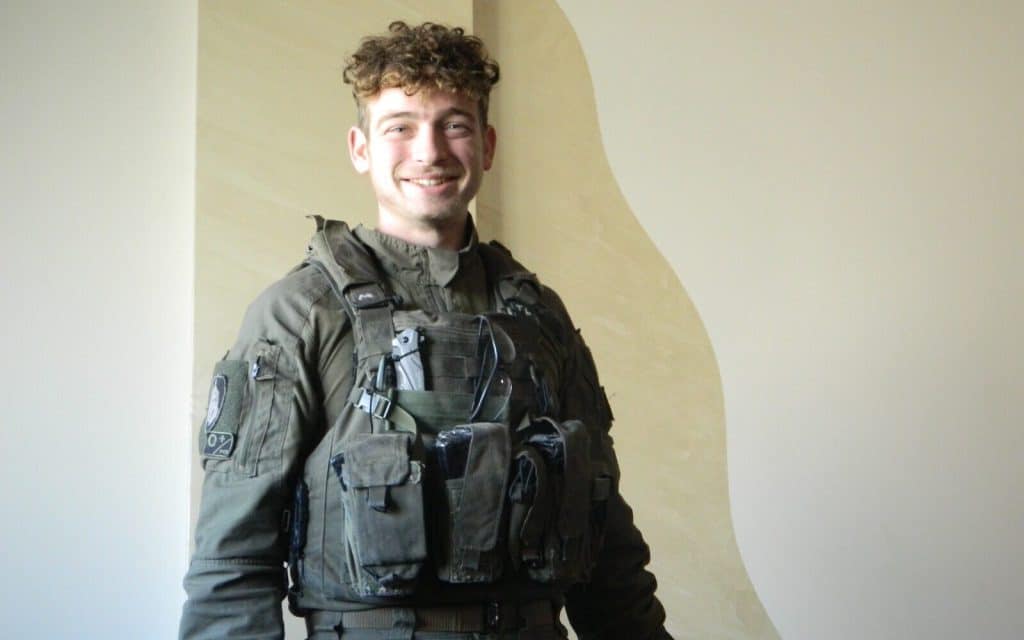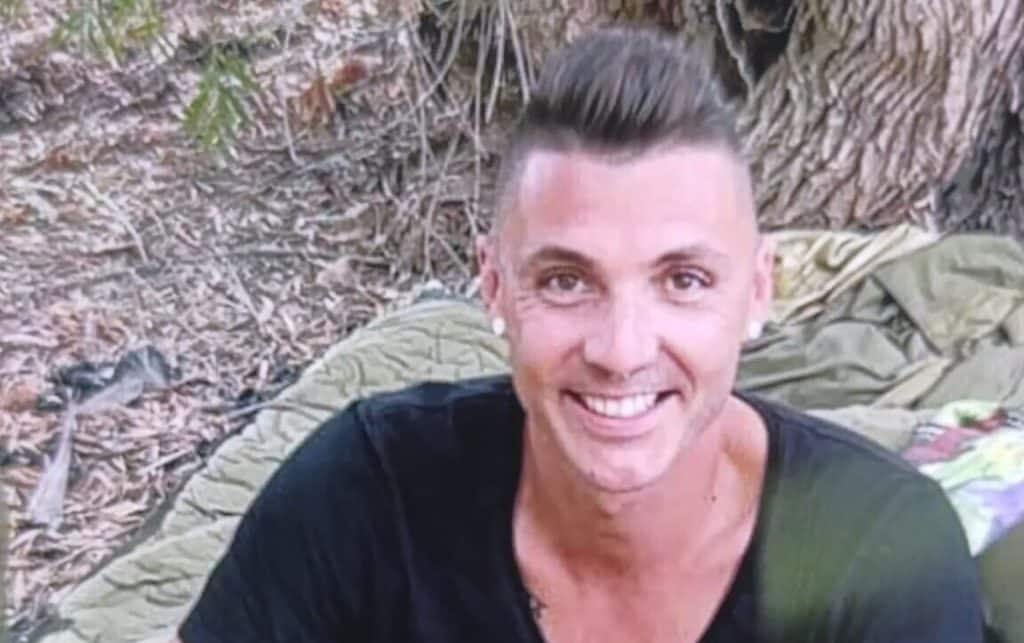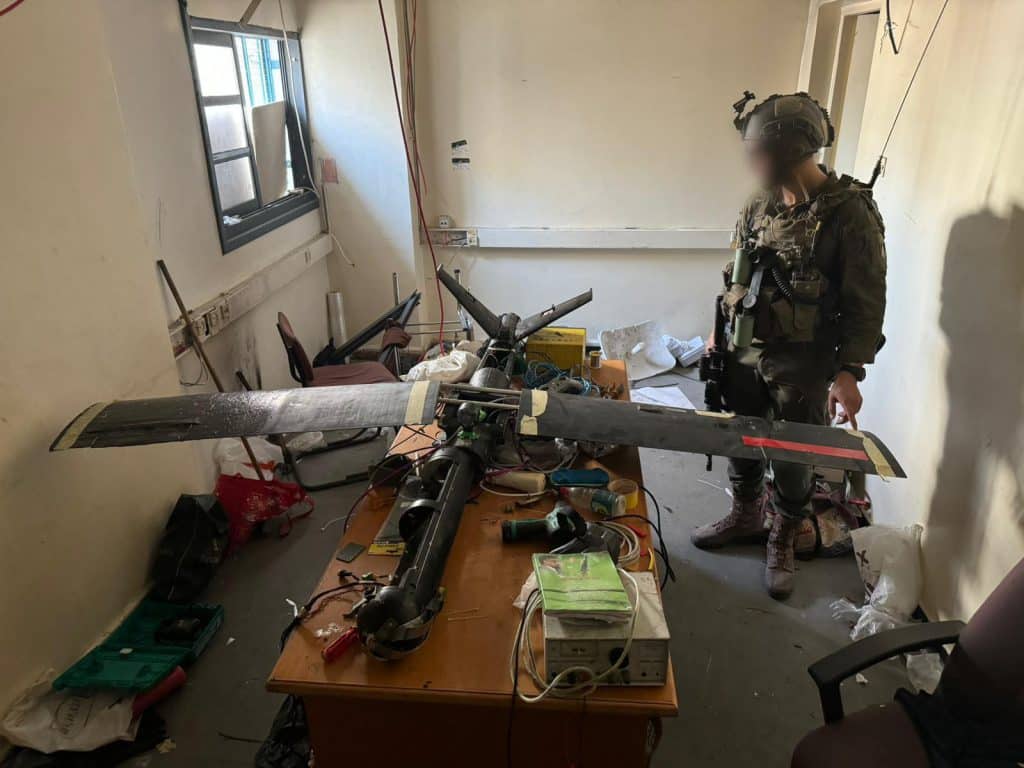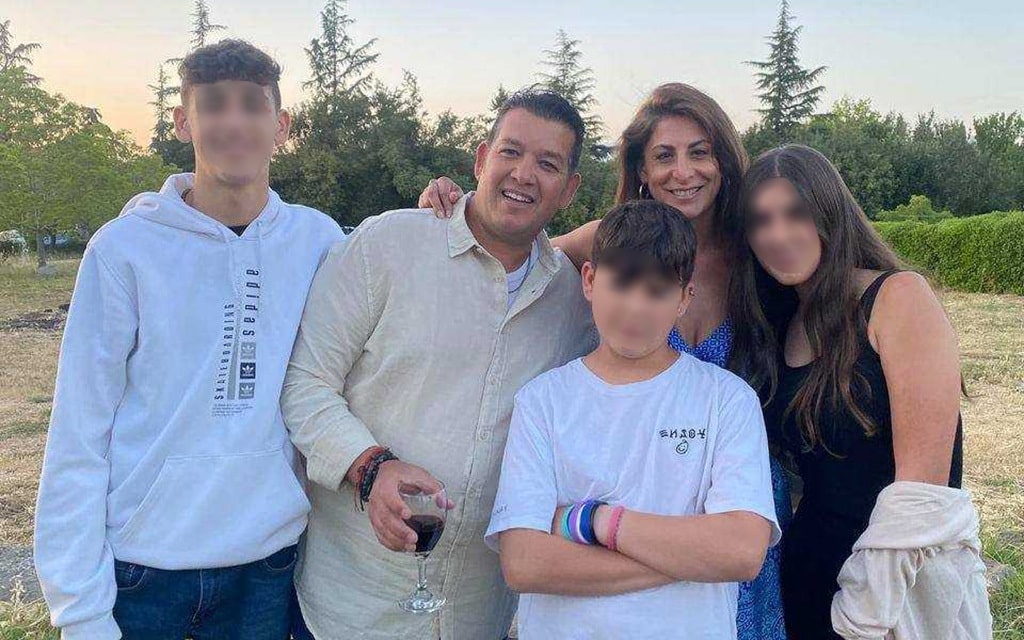
Overview
- The IDF targeted a Hamas compound in the southern Gaza Strip where Muhammad Deif, the commander of Hamas’s military wing, and Rafa’a Salameh, the commander of Hamas’s Khan Younis Brigade reportedly hiding. Deif’s fate is still unknown and Hamas claims that he survived the attack.
- The Israeli negotiation team returned from Doha after the first round of talks. The meeting in Doha included the heads of the Mossad, Shin Bet, Egyptian intelligence, the CIA, the Qatari government, and Major General Nitzan Alon and was focused on bridging the gaps towards achieving a hostage deal.
- The IDF called on civilians to flee the area of fighting in Gaza City and declared the area as a “dangerous combat zone”. Hamas tried to prevent this evacuation and many residents in the north refused to leave.
- The new Iranian president, Masoud Pezeshkian, wrote a letter to Hezbollah Secretary General, Hassan Nasrallah condemning Israel’s “criminal actions” in Gaza and affirming that Iran and its allies will stand by Hezbollah in case of an Israeli attack.
- Foreign ministers from four European countries pledged to Israeli Foreign Minister Israel Katz to support the designation of Iran’s Revolutionary Guards (IRGC) as a terrorist organization. This development follows Hungary joining Germany in promoting the decision in the EU, with the Netherlands now also sponsoring the initiative.
- Mohammad Baqer Qalibaf, chairman of the Iranian Shura Council, led a political and economic delegation to St. Petersburg, Russia, to participate in the BRICS parliamentary summit. Qalibaf met with Russian President Vladimir Putin on the sidelines of the BRICS summit. Putin said, “Our strong relationship with Tehran will continue.”
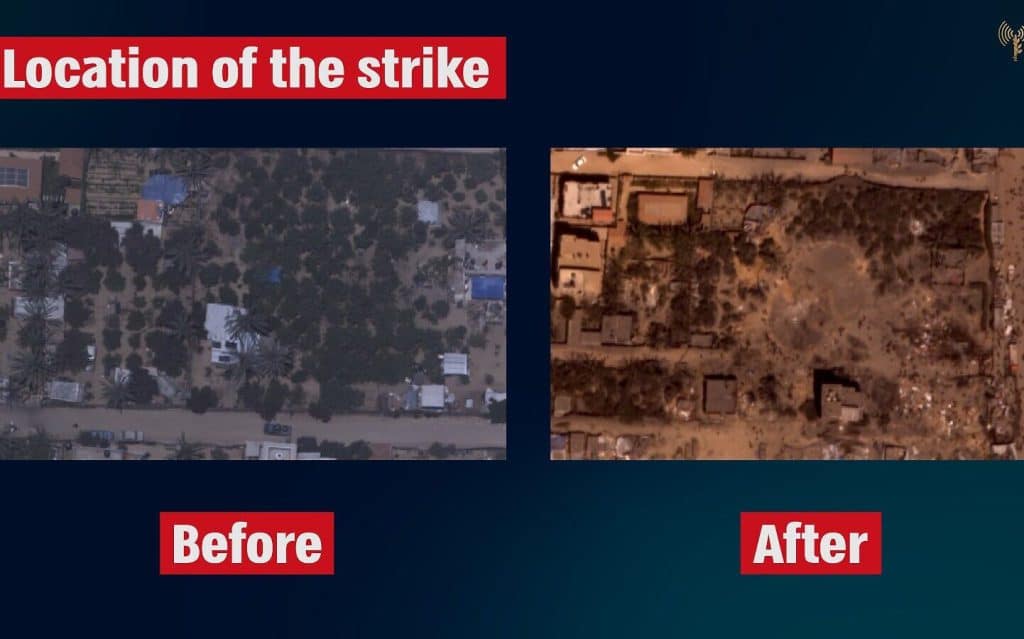
International
- Brazil ratified a free trade agreement with the Palestinian Authority to demonstrate “solidarity” with the Palestinians.
- Canada called on Israel to retract its decision to approve the designation off new communities in Judea and Samaria that Canada considers ‘illegal outposts’, stating that “the move violates international law.” The Canadian Foreign Ministry announced, “Canada strongly opposes the decision to approve new settlements in the West Bank.”
- Foreign ministers from four European countries-Netherlands, Czech Republic, Germany and Denmark, pledged to Israeli Foreign Minister Israel Katz to support the designation of Iran’s Revolutionary Guards (IRGC) as a terrorist organization. This development follows Hungary joining Germany in promoting the decision in the EU, with the Netherlands now also sponsoring the initiative.[can we list the 4 EU countries]
- Turkish President Recep Tayyip Erdoğan said at the NATO summit in Washington that his country “will not tolerate attempts by the North Atlantic alliance to cooperate with Israel.” He stated, “Israel cannot maintain its partnership with NATO.” He also instructed his foreign minister to meet with Syrian President Bashar al-Assad to “begin restoring relations between the two countries.”
- Argentina declared Hamas a terrorist organization: “Aligning with most western allies,” President Javier Milei’s office announced the freezing of the terrorist organization’s financial assets.
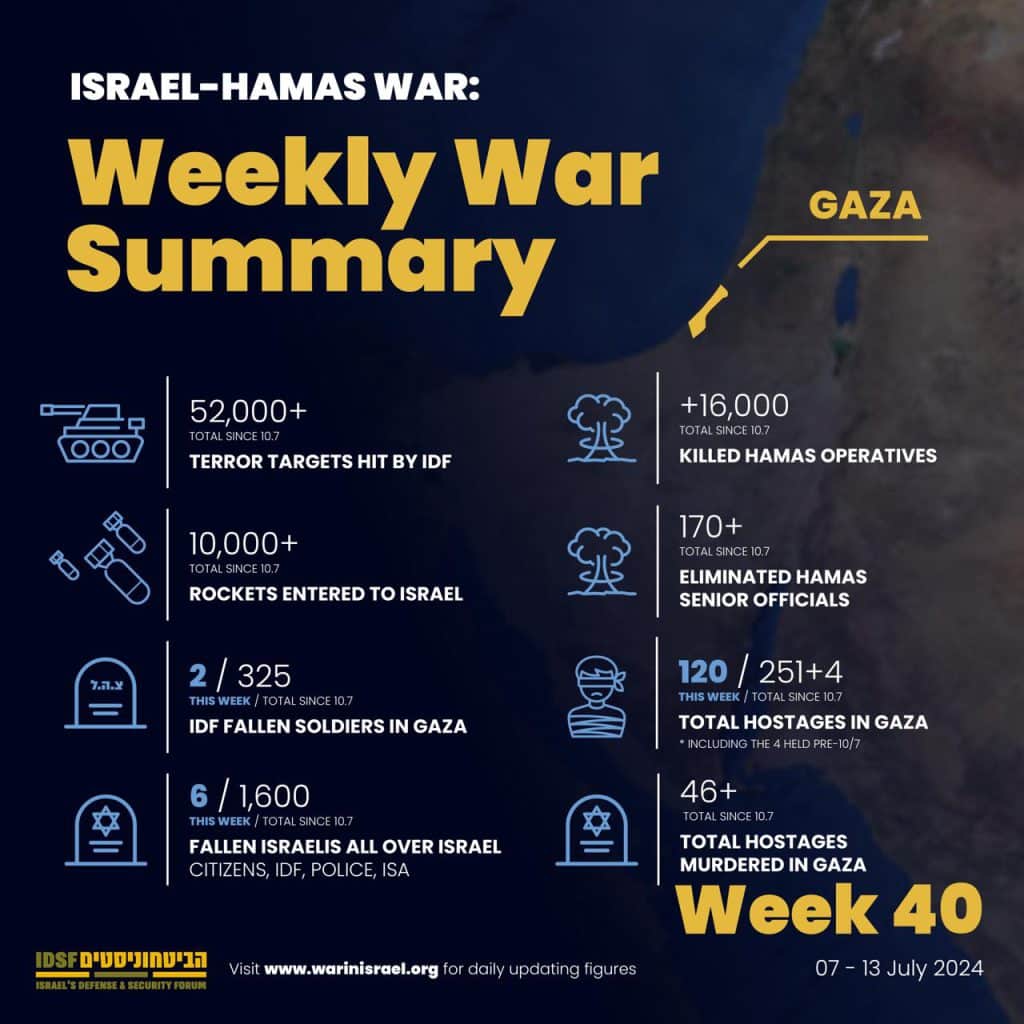
Gaza Strip
Diplomatic
- It has been reported that Hamas is moving its office equipment to Baghdad International Airport, intending to relocate its headquarters from Doha, Qatar, to Baghdad, which is closer to Iran than Qatar.
US role in the war
- The U.S. State Department imposed sanctions on nine individuals, organizations, and communities for violence against Palestinians or disrupting the transfer of food trucks from Jordan to the Gaza Strip. The sanctions include the seizure of any property or bank accounts they have in the U.S. and prohibit any American company from cooperating with them.
- Defense Minister Yoav Galant met for the second time with Special Envoy Brett McGurk to address the now acknowledged phenomenon that the US has been withholding/ delaying the transfer of crucial armaments to Israel. The two announced significant progress in overcoming the obstacles that have prevented the US from delivering the armaments to Israel, which are due to arrive in the coming days. These are crucial for Israel’s defensive capabilities along its northern front.
- In an opinion piece published in the Washington Post, citing unnamed senior American officials involved in the current negotiations, it was stated that 33 hostages would be released in the first six-week phase (all women, men over 50, and all injured) in exchange for several hundred security prisoners. Hamas relented and acquiesced to Israel’s demand for a commitment to a permanent ceasefire, a demand that would have guaranteed Hamas’s victory in the war.
- Despite significant security risks, the US, allegedly, plans to train a police force of approximately 2,500 Fatah-loyal Gazans who will attempt to replace Hamas’.
- The U.S. Central Command announced it would dismantle the floating dock that is created at cost estimated to be around $300 million dollars, and transfer it to the Port of Ashdod, where goods will be unloaded and transported i by trucks into Gaza.
Hostage Deal Negotiations
- The Israeli negotiation team returned from Doha after the first round of hostage release The meeting in Doha included heads of the Mossad, Shin Bet, Egyptian intelligence, the CIA, the Qatari government, and Major General Nitzan Alon to bridge the remaining gaps preventing a hostage deal. The Prime Minister’s Office announced that the team was briefed and departed Thursday evening for further talks in Cairo, led by the head of the Shin Bet.
- These discussions are focused on achieving a ceasefire that will free hostages and lay the groundwork for a more permanent IDF presence in Gaza once the heavy fighting conclude. This includes guaranteeing thee IDF operational freedom to continue fighting even after the release of some hostages, and until Hamas is fully destroyed.
- Mossad chief Dedi Barnea stated in a cabinet meeting regarding the hostage deal that “without the conditions Prime Minister Netanyahu insists on, we will not be able to resume the war, and without that, we will not win and will not bring back all the hostages.” He added, “Without the IDF’s work and the force we are applying in Gaza, we would achieve nothing. The stronger and more aggressive the army operates in Gaza, the more successful we will be in negotiations. We need to increase the [military] pressure in Gaza.”
- President Biden’s special envoy to the Middle East, Brett McGurk, visited Israel and met separately with Prime Minister Netanyahu and Defense Minister Gallant. Gallant tweeted afterward that Israel is determined to free all the hostages, and there is progress in talks with Egypt.
- Gallant said Israel would agree to withdraw from the Philadelphi Corridor if a solution is found to prevent smuggling, with coordination with Egypt for sealing all tunnels on the Egyptian side and deploying sensors along the route to detect any tunnel digging in real time enabling its immediate destruction Egypt has committed to locating and sealing all tunnels crossing into its territory, deploying cameras, and positioning a foreign force without an IDF military presence along the route. The main point of contention with Egypt is the control of the Philadelphi corridor as Egypt is demanding Israel’s withdrawal from the Philadelphi Route and wants to have Palestinian presence on the other side of the border. Instead, Israel demands the right to have the final say on security arrangements veto on the corridor and is proposing the establishment of a new border we crossing near the Kerem Shalom crossing without any involvement of the Palestinian Authority or any Gazan entity (and certainly not Hamas).
A Hamas drone found by IDF troops at UNRWA’s headquarters in Gaza City, in a handout photo published July 12, 2024| Source: IDF Spokesperson - Netanyahu spoke at the officers’ graduation ceremony at the officer training base of “Bahad 1” on Thursday and mentioned his commitment to the hostage deal under the following four conditions:
- Resuming combat until all war objectives are achieved.
- Full Israeli control over the Philadelphi Corridor to prevent any smuggling of weapons from Egypt.
- Preventing the return of terrorists or the transfer of weapons to the northern part o the Gaza Strip.
- Maximizing the number of hostages released in the first phase of the ceasefire.
- Ismail Haniyeh threatened to cease negotiations as long as the operations of Divisions 98 and 99 in Gaza City continue.
- After 3 intense days of negotiations Egyptian mediators have paused talks d blaming Israel for a lack of seriousness and internal discord.
Operational
Gaza City Operations
The Operation in Sajaiya has concluded, with Division 98, consisting of paratrooper and armor brigades (including Brigade 7 and Yahalom), completing a two-week mission in the Sajaiya neighborhood. Two additional tunnels were discovered and destroyed, bringing the total to eight. The tunnels destroyed on Wednesday contained numerous weapons, computers, and communication equipment for above-ground combat management, along with electrical and gas infrastructure to allow prolonged underground stays. In total at least 6 kilometers of tunnel routes were identified and destroyed, including two offensive tunnels near the security fence and the community of Nahal Oz, and four others classified as approach tunnels. A flagship tunnel of the Islamic Jihad, 2.5 kilometers long, was discovered and destroyed. This tunnel contained command and control positions, computers, communication stations, and, of course, weapons
Despite successes in both Tel al-Hawa and Sajaiya in the east, terrorist factions continue to launch rocket barrages from northern Gaza,, demonstrating that Hamas and other terrorists still possess silos of rockets.
Division 99 soldiers are fighting in southern Gaza Cityand have eliminated many terrorists.. During their operations, they discovered a lathe for manufacturing weapons and significant amounts of terrorist funds. The Islamic Jihad claimed responsibility for a series of rocket barrages on Thursday, targeting Ashdod, Ashkelon, Sderot, and other communities. Alongside this, three other terrorist factions launched rocket barrages. from Beit Hanoun in northern Gazay and the Air Force retaliated by targeting terrorist infrastructure in that city identified as launch points.
The IDF raided UNRWA’s headquarters in Gaza City — located near the Rimal and Tel al-Hawa neighborhoods — which were used by Hamas and Palestinian Islamic Jihad to carry out attacks against the IDF
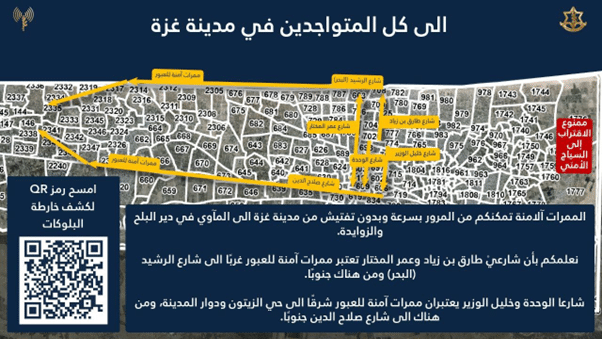
IDF Orders Civilians to Evacuate to the Humanitarian Zone
Despite the IDF evacuation orders and the declaration of Gaza City as a “dangerous combat zone,” many residents in the north refuse to leave despite bombings and food shortages. The IDF’s Arabic spokesperson announced on social media and via air-dropped leaflets that all residents of the northern Strip must evacuate south to the Az-Zuweida camp and Deir al-Balah city. The IDF aims for a complete evacuation of civilians from the north to deny Hamas the use of human shields and resources for reorganizing its battalions. This evacuation serves two additional purposes: preventing or reducing possible terrorist ambushes in the Gaza metropolitan area during the duration of a potential ceasefire deal allowing the IDF to focus on systematically destroying all tunnels and underground infrastructure while applying pressure on Hamas in negotiations.
The Hamas Government Information Office called on residents not to evacuate and accused the IDF of publishing “incorrect” maps to lure residents into “death traps.” The residents’ refusal to evacuate also stems from the overcrowding in the humanitarian area and warnings on social media from those who have evacuated to stay in the north. Approximately 10,000 Gazans from neighborhoods within Gaza City have gathered along the coastline, insisting on staying put. They are also wary of passing through the crossings on the Nezarim Corridor, fearing vetting by the IDF and potential arrests for affiliation with terrorist organizations or involvement in massacres.
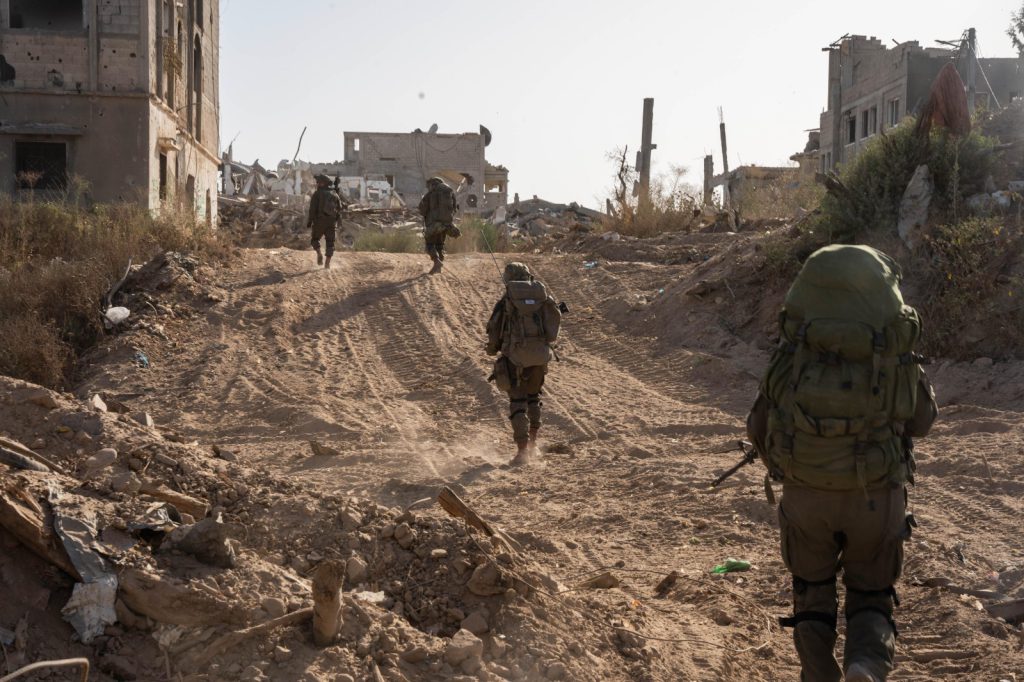
Rafah Operations
In the Rafah area, Hamas, Islamic Jihad, and another terrorist faction claimed multiple attacks against the soldiers, including anti-tank fire, bombs against tanks and bulldozers, mortar fire, and sniper fire. Their resistance is concentrated in Tel Sultan and Tel Zorob in the western part of the area. Rocket barrages were launched from Rafah towards several communities in the southern periphery.
- The IDF targeted a Hamas compound in southern Gaza where Muhammad Deif, the commander of Hamas’s military wing, and Rafa’a Salameh, the commander of Hamas’s Khan Younis Brigade was reportedly hiding. Deif’s fate is still unknown although Hamas claims that he survived the attack.
- A three-story tunnel crossing into the Sinai Peninsula was discovered under the Philadelphi Corridor, demonstrating the magnitude of Hamas’s engineering capabilities in il constructing smuggling tunnels to and from Egypt.
- The AP reported about a significant disagreement between Hamas leadership in Gaza and the overseas leadership during May-June, with some Gazans demanding a ceasefire due to harsh conditions.
- Hamas spokesperson Abu Ubaida declared that since the beginning of the war, they have recruited thousands of militants, with thousands more ready to enlist. They have rebuilt workshops for weapon manufacturing and are using remnants to produce new explosives, asserting their readiness to resume fighting. He claimed that nine months of the campaign have not broken them but have instead broken the Zionist enemy as they rebuild their army.
- The IDF, guided by intelligence from the Shin Bet and Military Intelligence, eliminated Hamas militant Ayman Shwadeh, the deputy commander of the Sajaiya Battalion.
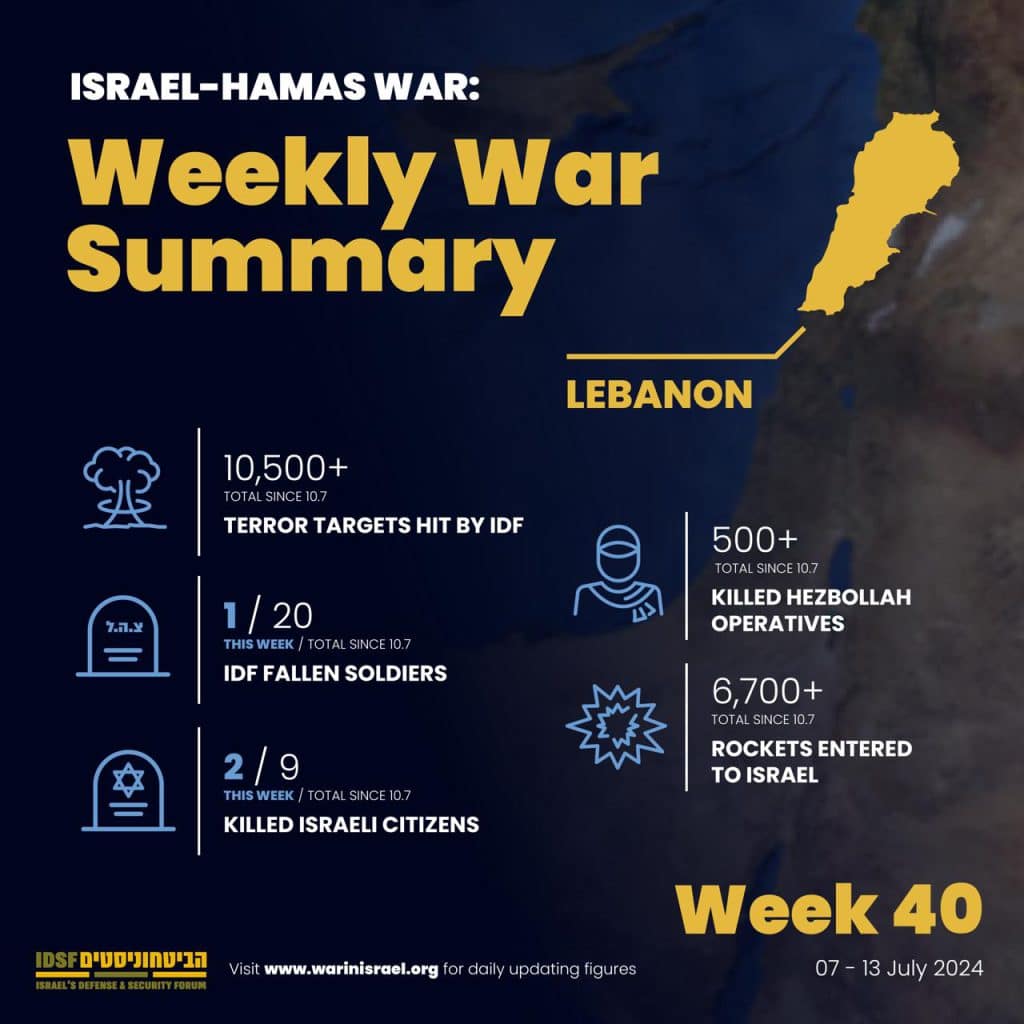
Lebanon
Diplomatic
- During his visit to the north on Sunday, Defense Minister Gallant spoke about the distinction between the two fronts (Gaza and Lebanon) stating that operations in the north will continue even if there is a ceasefire in the south. Gallant mentioned that since the beginning of the war, 450 Hezbollah militants have been eliminated, including 15 at the rank of brigade commander.
- Hezbollah chief Hassan Nasrallah said Hezbollah would accept Palestinian ally Hamas’s decision on Gaza hostage negotiations and would stop cross-border attacks on Israel if a ceasefire were reached.
Operational
- After the elimination of a Hezbollah operative in Syria, Hezbollah launched a barrage of 40 rockets towards the Golan Heights,which killed two civilians, a mother and a father of 3 young children, who were by rocket fire while driving.
- The IDF determined that the reason why the ant-missile system didn’t deploy in thr case of the above attack was an operational failure, as the area where the rockets were fired had been designated as “open territory,” so interceptors were not activated. Despite the proximity to a military base and the fact that the road in the area is the only connection between the Golan Heights and the Hula Valley, meaning it is a main transportation route, the deaths could have been avoided if the rockets had been programmed to be
- Nasrallah stated that Hezbollah is ready for an attack, while Israel is exhausted from the numerous attacks, and its society and economy are worn out due to the extensive reserve call-up over the last nine months.
- According to Reuters, Hezbollah operatives have switched to using pagers and runners instead of cell phones to avoid detection and their elimination by the Air Force. They have also been using an Iranian communication cable laid from Beirut to the Lebanese Beqaa Valley.
- Hezbollah released spy drone footage showing a series of IDF military bases, Iron Dome batteries, radar systems, and various brigade headquarters. This video continues their propaganda, and serves as a warning to Israel.
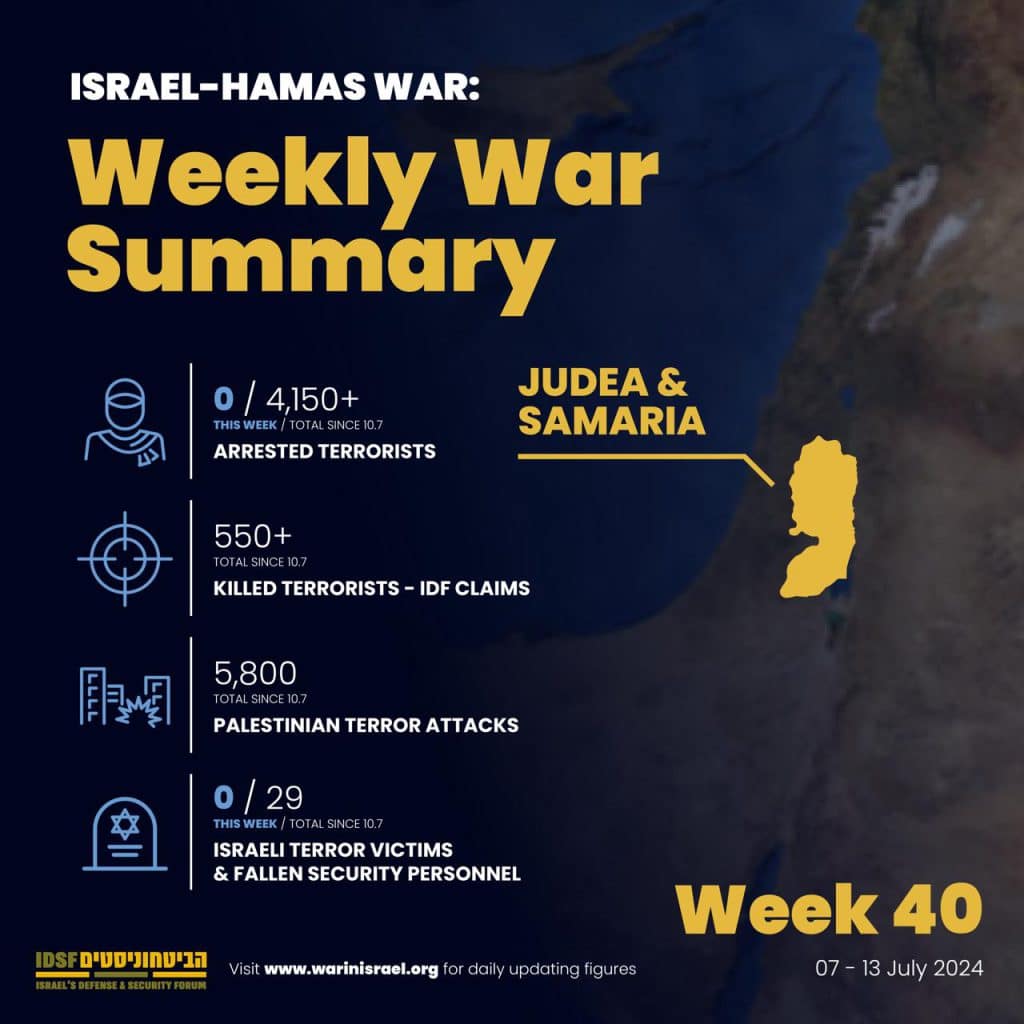
Judea and Samaria
- In a comprehensive operation across Judea and Samaria, 150 bags of materials (mainly fertilizer) intended for the making of explosive devices were confiscated. Six shop owners who sold them to terrorist organizations were arrested, and six more suspects were detained in the sector. According to the ISW Institute, fertilizer is a main component in homemade explosives. A 2015 U.S. Army report claims that 74% of all IEDs in Afghanistan against NATO forces up to that year were made with fertilizer, which contains the necessary components for explosives.
- A meeting of the PLO Executive Committee discussed the need to exert pressure to stop the “genocide” against Palestinians. The participants called for sanctions on Israeli government members for “escalating crimes” and decided to expand the campaign to prosecute “war crimes” and “occupation violations” against Palestinian prisoners at the International Criminal
- The Islamic Bloc, Hamas’s student wing in Palestinian universities, called on hackers to attack IDF websites. Unlike recent calls for shooting, ramming, or stabbing attacks, this call for a “cyber attack” is one of the few in recent months.
- In response to the Israeli site ‘Hamas Massacres’ launched after the October 7 massacre, the Muslim Brotherhood is promoting a counter-site ‘Israel Massacres,’ aiming to push the false Palestinian narrative. This professionally presented site is full of distorted facts and quotes, allegedly proving Israel’s “genocide” against Palestinians.
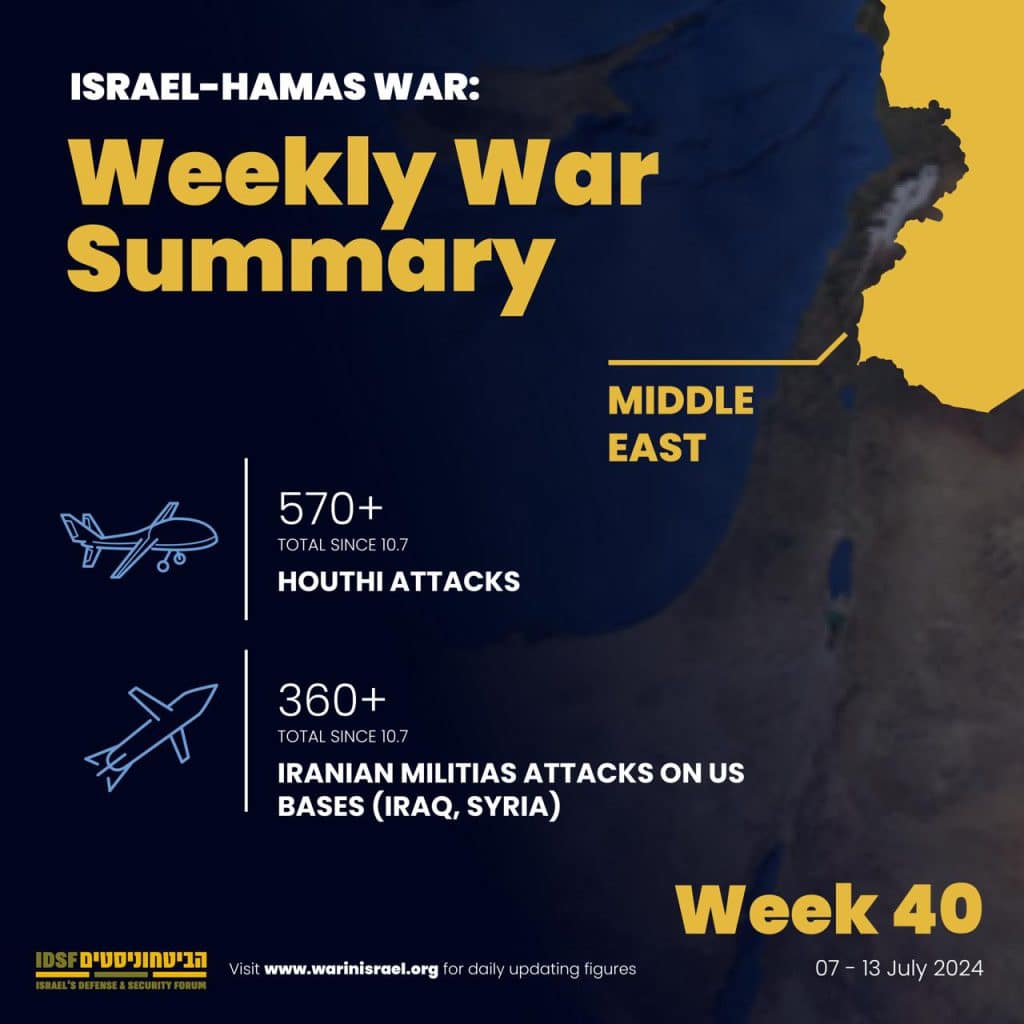
Yemen
- The Houthis have threatened Saudi Arabia due to its support for the U.S.
Iraq and Syria
- Deputy Secretary-General of the Popular Front, Jamil Mazhar, met in Baghdad with leaders of three different Shiite militias: Badr, Asa’ib Ahl al-Haq, and the Mujahideen and Construction Movement. He praised them for their attacks on U.S. bases in Syria and Iraq and discussed expanding cooperation against Israel. Hamas and Islamic Jihad representatives also arrived in Beirut for similar meetings as Hamas is in the process of moving its offices from Doha to Baghdad, where it will be protected by Iran.
- The IDF attacked Syrian military infrastructure that violated the separation of forces agreement in the Golan Heights.
- Tens of thousands of Syrian civilians who served in the reserves will be released consistent with a three-phase plan to be implemented from early July to the end of October 2025, with the maximum reserve service period reaching two years in the third phase. The Syrian army is detaining civilians and forcibly conscripting them. The Russian army has been training the Syrian army for many months in how to operate various weapons, and have been conducting training for air, sea, and land maneuvers. In the past year alone, tens of thousands of fighters have entered Syria bringing huge number of weapons in planning a multi front war against Israel.
Iran
- The new Iranian president, Masoud Pezeshkian, wrote a letter to Nasrallah condemning Israel’s “criminal actions” in Gaza and affirming that Iran and its allies will stand by Hezbollah in case of an Israeli attack. The Iranian Foreign Ministry spokesperson reiterated similar statements of support in the event of an Israeli attack.
- Recently, ISW reported that in August and October 2023, two facilities for manufacturing ballistic missiles and UAVs began construction near Tehran, intended for supply to Russia, the Houthis, and Hezbollah.
Iranian-Russian Relations
Mohammad Baqer Qalibaf, chairman of the Iranian Shura Council, led a political and economic delegation to St. Petersburg, Russia, to participate in the BRICS parliamentary summit. Qalibaf met with Russian President Vladimir Putin on the sidelines of the BRICS summit. Putin said, “Our strong relationship with Tehran will continue.” Russian Deputy Foreign Minister Andrei Rudenko called Iran one of Russia’s most important partners and friends, emphasizing that Moscow hopes to sign a comprehensive cooperation agreement with Tehran soon. During a press conference, Rudenko pointed to the increasing ties between Russia and Iran and several meetings between the two countries over the years. “As a result of these many meetings, Iran has become one of Russia’s most important partners and friends,” he said.
Fallen Soldiers
